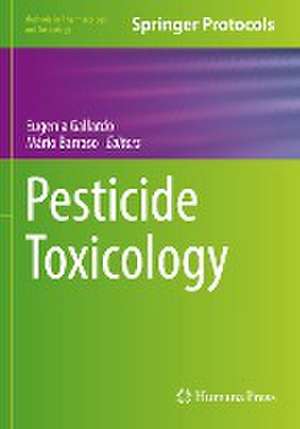Pesticide Toxicology: Methods in Pharmacology and Toxicology
Editat de Eugenia Gallardo, Mário Barrosoen Limba Engleză Paperback – 30 noi 2022
Authoritative and practical, Pesticide Toxicology is an ideal reference for academia, analysts, toxicologists, environmentalists, and health and industry professionals aiming to understand the associated risks and to limit the use of these substancesand minimize their potential damage to human health and the environment.
| Toate formatele și edițiile | Preț | Express |
|---|---|---|
| Paperback (1) | 839.87 lei 6-8 săpt. | |
| Springer Us – 30 noi 2022 | 839.87 lei 6-8 săpt. | |
| Hardback (1) | 1290.48 lei 6-8 săpt. | |
| Springer Us – 30 noi 2021 | 1290.48 lei 6-8 săpt. |
Din seria Methods in Pharmacology and Toxicology
- 5%
 Preț: 1114.91 lei
Preț: 1114.91 lei - 5%
 Preț: 1120.40 lei
Preț: 1120.40 lei - 5%
 Preț: 1310.03 lei
Preț: 1310.03 lei - 5%
 Preț: 709.11 lei
Preț: 709.11 lei - 5%
 Preț: 1049.82 lei
Preț: 1049.82 lei - 5%
 Preț: 1058.25 lei
Preț: 1058.25 lei - 5%
 Preț: 1114.91 lei
Preț: 1114.91 lei - 5%
 Preț: 1106.69 lei
Preț: 1106.69 lei - 5%
 Preț: 1631.16 lei
Preț: 1631.16 lei - 5%
 Preț: 1042.29 lei
Preț: 1042.29 lei - 5%
 Preț: 732.36 lei
Preț: 732.36 lei - 5%
 Preț: 1042.69 lei
Preț: 1042.69 lei - 5%
 Preț: 1632.41 lei
Preț: 1632.41 lei - 5%
 Preț: 1120.55 lei
Preț: 1120.55 lei - 5%
 Preț: 1362.85 lei
Preț: 1362.85 lei - 5%
 Preț: 704.74 lei
Preț: 704.74 lei - 5%
 Preț: 1010.07 lei
Preț: 1010.07 lei - 5%
 Preț: 859.82 lei
Preț: 859.82 lei - 5%
 Preț: 1133.18 lei
Preț: 1133.18 lei - 5%
 Preț: 728.52 lei
Preț: 728.52 lei - 5%
 Preț: 708.41 lei
Preț: 708.41 lei - 5%
 Preț: 731.64 lei
Preț: 731.64 lei - 5%
 Preț: 1106.69 lei
Preț: 1106.69 lei - 5%
 Preț: 735.46 lei
Preț: 735.46 lei - 5%
 Preț: 722.48 lei
Preț: 722.48 lei - 5%
 Preț: 1306.92 lei
Preț: 1306.92 lei - 5%
 Preț: 1123.33 lei
Preț: 1123.33 lei - 5%
 Preț: 735.83 lei
Preț: 735.83 lei - 5%
 Preț: 1109.08 lei
Preț: 1109.08 lei - 5%
 Preț: 727.44 lei
Preț: 727.44 lei - 5%
 Preț: 724.50 lei
Preț: 724.50 lei - 5%
 Preț: 1116.94 lei
Preț: 1116.94 lei - 5%
 Preț: 944.48 lei
Preț: 944.48 lei - 5%
 Preț: 1045.42 lei
Preț: 1045.42 lei
Preț: 839.87 lei
Preț vechi: 884.08 lei
-5% Nou
Puncte Express: 1260
Preț estimativ în valută:
160.71€ • 171.85$ • 133.100£
160.71€ • 171.85$ • 133.100£
Carte tipărită la comandă
Livrare economică 17 aprilie-01 mai
Preluare comenzi: 021 569.72.76
Specificații
ISBN-13: 9781071619308
ISBN-10: 1071619306
Pagini: 196
Ilustrații: IX, 196 p. 40 illus., 24 illus. in color.
Dimensiuni: 178 x 254 mm
Greutate: 0.37 kg
Ediția:1st ed. 2022
Editura: Springer Us
Colecția Humana
Seria Methods in Pharmacology and Toxicology
Locul publicării:New York, NY, United States
ISBN-10: 1071619306
Pagini: 196
Ilustrații: IX, 196 p. 40 illus., 24 illus. in color.
Dimensiuni: 178 x 254 mm
Greutate: 0.37 kg
Ediția:1st ed. 2022
Editura: Springer Us
Colecția Humana
Seria Methods in Pharmacology and Toxicology
Locul publicării:New York, NY, United States
Cuprins
1- Overview.
2- Sample preparation approaches and methods to detected and quantify different classes of compounds, as well as approaches for in vivo and in vitro toxicity evaluation.
The classes of pesticides will be as follows.
•Insecticides, such as organochlorines, organophosphates and carbamates. This category also includes insect repellents such as citronella (of natural origin) and diethyltoluamide (DEET), and others.
•Herbicides or weed killers (e.g. paraquat, diquat and glyphosate, and others).
•Fungicides (when applied to wood, these are called wood preservatives).
•Rodenticides.
•Fumigants, meaning those compounds that exist either as a gas or a vapor at room temperature and may be used as insecticides, fungicides or rodenticides, especially in closed storage places. They are extremely harmful due to their physical properties, rapid environmental dissemination and human or animal absorption (examples include aluminum phosphate, cyanide and methyl bromide). •Other pesticides, including algaecides, miticides and acaricides.
2- Sample preparation approaches and methods to detected and quantify different classes of compounds, as well as approaches for in vivo and in vitro toxicity evaluation.
The classes of pesticides will be as follows.
•Insecticides, such as organochlorines, organophosphates and carbamates. This category also includes insect repellents such as citronella (of natural origin) and diethyltoluamide (DEET), and others.
•Herbicides or weed killers (e.g. paraquat, diquat and glyphosate, and others).
•Fungicides (when applied to wood, these are called wood preservatives).
•Rodenticides.
•Fumigants, meaning those compounds that exist either as a gas or a vapor at room temperature and may be used as insecticides, fungicides or rodenticides, especially in closed storage places. They are extremely harmful due to their physical properties, rapid environmental dissemination and human or animal absorption (examples include aluminum phosphate, cyanide and methyl bromide). •Other pesticides, including algaecides, miticides and acaricides.
Textul de pe ultima copertă
This detailed volume explores practical procedures on the identification and quantification of pesticides in a variety of samples. Chapters guide the reader through methods and protocols for the extraction of pesticides from biological and non-biological samples, pitfalls in dosing techniques and structures identification, and also provide an overview of the problems that these pesticides cause in human populations. As part of the Methods in Pharmacology and Toxicology series, chapters include introductions to their respective topics, lists of reagents and materials, step-by-step guides and reproducible lab protocols, as well as valuable tips on addressing common problems and avoiding known pitfalls.
Authoritative and practical, Pesticide Toxicology is an ideal reference for academia, analysts, toxicologists, environmentalists, and health and industry professionals aiming to understand the associated risks and to limit the use of these substancesand minimize their potential damage to human health and the environment.
Caracteristici
Includes cutting-edge techniques Provides step-by-step detail essential for reproducible results Contains key implementation advice from the experts
